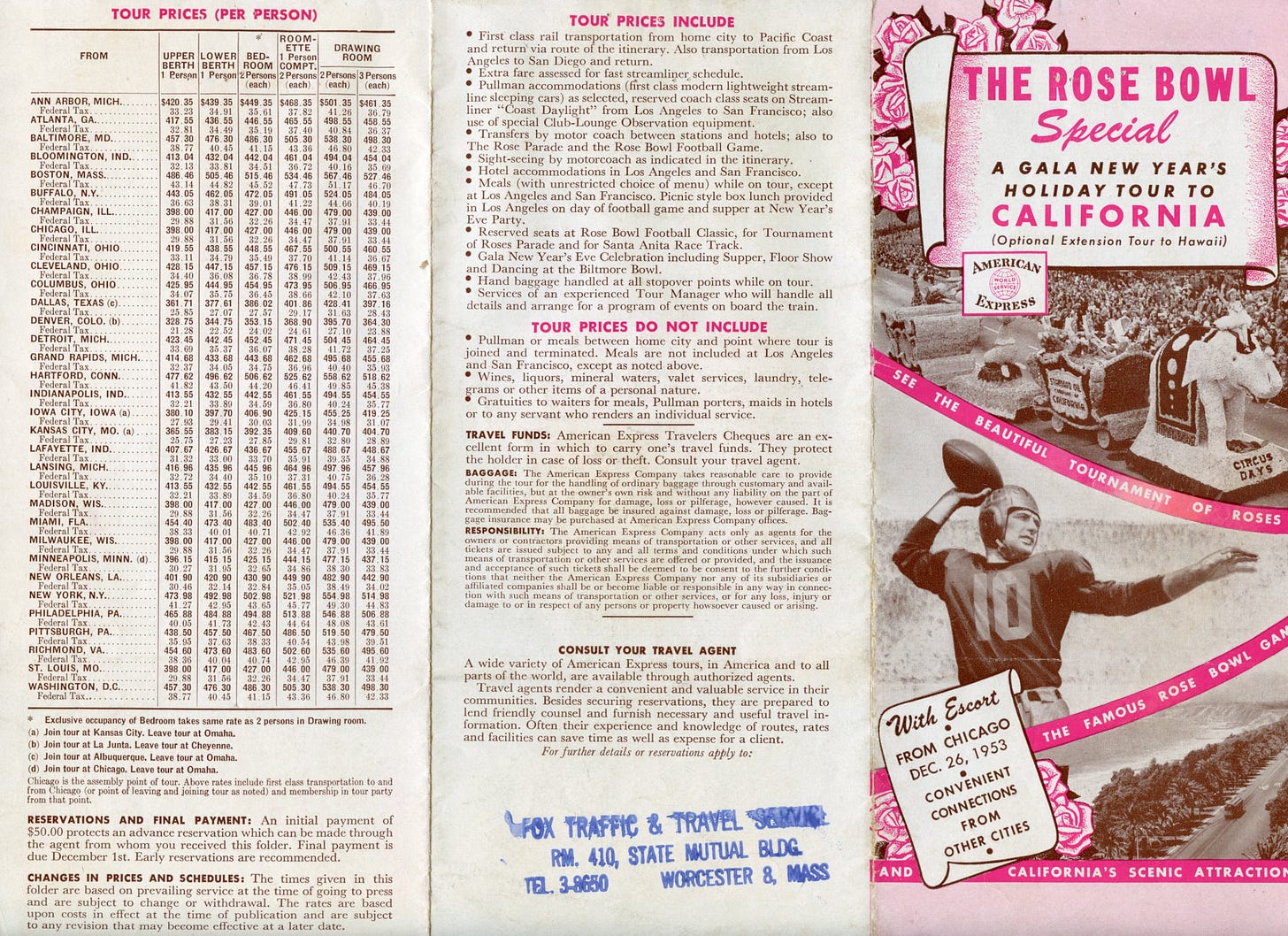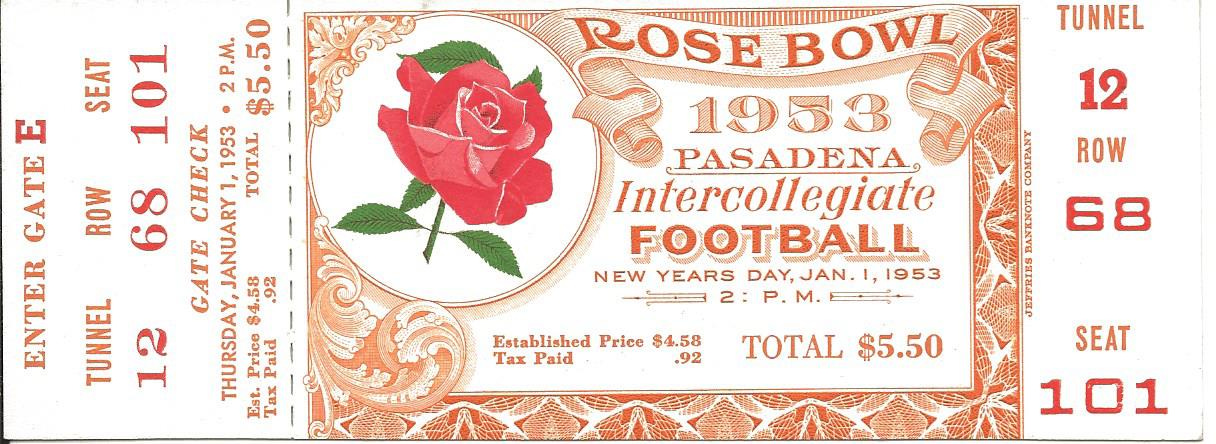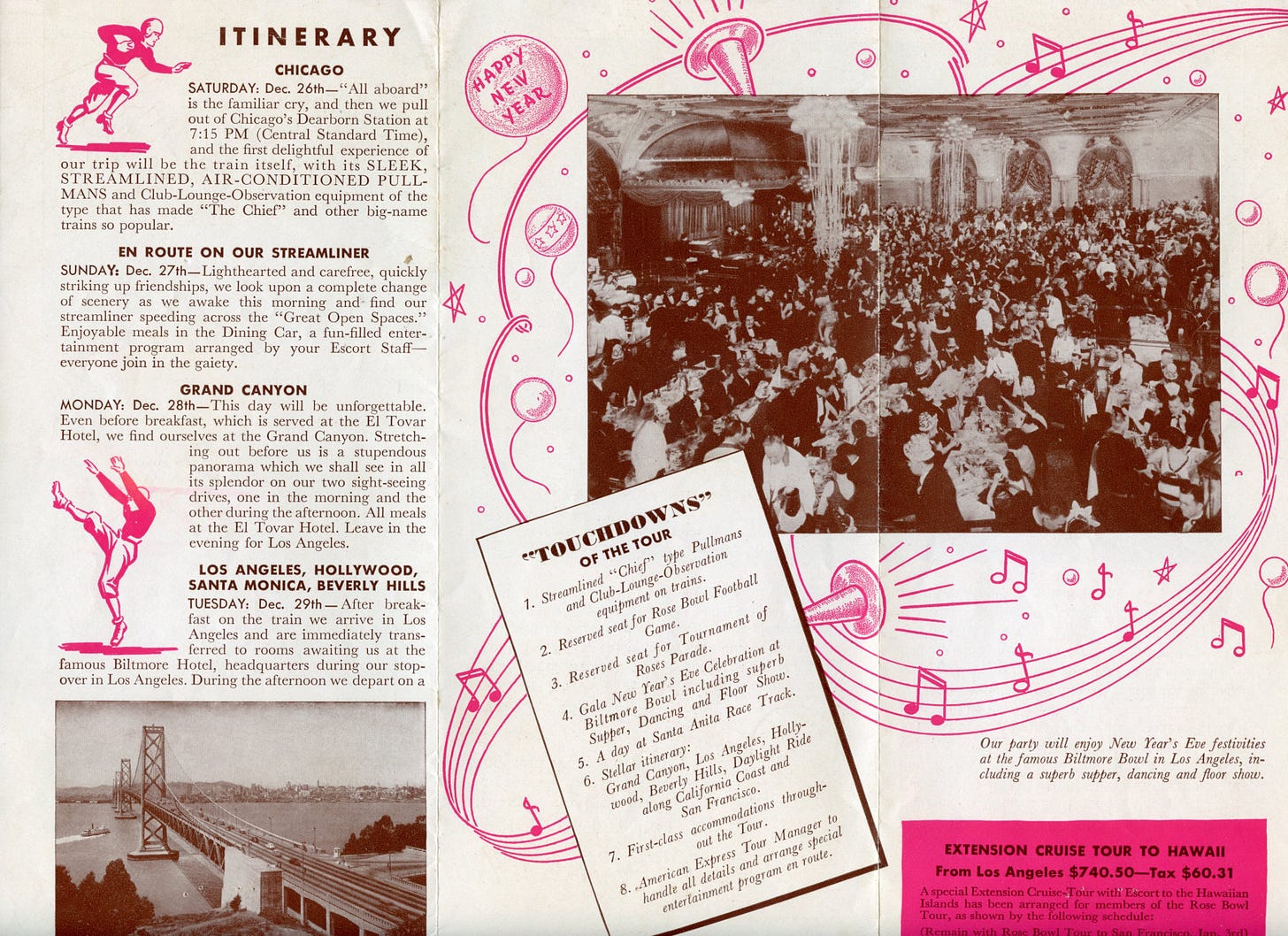American Express And The 1953 Rose Bowl
Before the 1947 Rose Bowl, the big game in Pasadena typically involved the best team from the Pacific Coast Conference (PCC) and the best team east of the Rockies willing and able to make the trip. The Big Ten and some individual schools did not allow postseason play, so the best of the SEC, ACC, and independents headed West each year. However, things changed for the 1947 game after the Rose Bowl, and PCC agreed to pair up with the Big Ten champion for the annual game.
Although concerns remained about the commercialization of the college game, Midwestern fans embraced the matchup, especially when your team earned the right to play in Pasadena. Commercial organizations, including American Express, saw opportunities in the new arrangement. The company, which began as a freight forwarding service, entered the financial services business with money orders in 1857, traveler's cheques in 1891, and added a travel service in 1915 to further assist its customers looking to access and spend their money when away from home.
The good folks at American Express soon recognized that the Big Ten-PCC Rose Bowl alliance presented a money-making opportunity for their firm. Previously, the Eastern team could come from anywhere other than Big Ten territory, so arranging Rose Bowl package tours without knowing the selected team's location wasn't easy. However, with the Eastern team originating in Big Ten country, their fans would have to travel by rail through the hub of railroad traffic, Chicago.
Starting in 1950, American Express acquired a block of reserved Rose Bowl tickets and arranged an itinerary they repeated for the next dozen-plus years, carrying fans of whichever Big Ten team qualified for the Grandaddy of Them All. There may even have been a stray PCC fan or two who had been banished to the Midwest that took the trip.
The 1953 Rose Bowl featured the #5 USC Trojans, making their eleventh appearance, and the #11 Wisconsin Badgers, making their first, though the Dairylanders were invited to the 1903 Rose Bowl Game That Never Was. Wisconsin tied Purdue for the Big Ten title but had a better overall record and was higher ranked.
Since the Big Ten had beaten the PCC in the six meetings since the pairing began, the Trojans hoped 1953 might be the year they led the parade. The Badgers, on the other hand, lacking an indoor practice facility, started their trip to Pasadena on December 17, flying rather than entraining for the trip.
The 1952 Rose Bowl was the first nationally televised game in any sport, so the folks in Wisconsin could stay home to watch the 1953 game on TV, but the American Express tour and several group tours put together by the Wisconsin Student Association attracted enough participants to ensure a solid representation of fans wearing the correct shade of red.
The fans traveling with American Express made their way to Chicago's Dearborn Station for a 7:15 PM departure on the 26th for a delightful trip by Pullman car and club, lounge, and observation car service. They sped through the Great Plains on the 27th before disembarking to peer at the Grand Canyon on the 28th. Onward to LA they went, arriving on the 29th to take their rooms at the Biltmore Hotel and tour Hollywood and Santa Monica. On the 30th, they raced to the track at Santa Anita, and the 31st was at leisure before a New Year's Eve celebration at the Biltmore.
During their stay, Badger fans mixed it up with Hollywood and former Wisconsin football stars, hoping against hope for a victory on New Year's Day.

The trip's highlight came when attending the Rose Bowl with tickets provided by American Express. It was a beautiful Southern California day, perfect for a hard-fought football game. Both teams moved the ball, but the defenses stiffened when in scoring range. The Badgers outgained USC 353 to 233, but while they penetrated the Trojans' 25-yard line five times, they never scored. The Trojans crossed the Badgers' 25-yard line three times and earned the game's only scoring play when Rudy Bukich tossed a third-quarter pass to Al Carmichael in the end zone. A converted kick gave the Trojans a 7-0 lead and victory when the last Badger drive ended in the red zone.

After drowning their sorrows at hospitality events sponsored by several Milwaukee breweries, the fans boarded the train Saturday morning for a ride up the California coast to San Francisco. (Those with more time on their hands boarded the S.S. Lurline for a 22-day Hawaiian excursion.) A day in San Francisco, followed by two days on the return train, led to the trip ending in Chicago on January 6.
Badger fans returned for the 1960 and 1963 Rose Bowls, both losses, before earning victories in 1993, 1999, and 2000. Three straight losses from 2011 to 2013 left their Rose Bowl record at 3-6, not counting the 1903 forfeit. Of course, most Wisconsin fans flew to the last eight appearances. Advances in commercial aviation made eleven-day holiday trips by train, including stops at the Grand Canyon and San Francisco, a thing of the past. The jetsetters carrying American Express cards could leave home without going by train.
Football Archaeology is reader-supported. Click here to buy one of my books or otherwise support the site.










I am certain that on this trip there were no instances of overconsumption of alcoholic beverages.